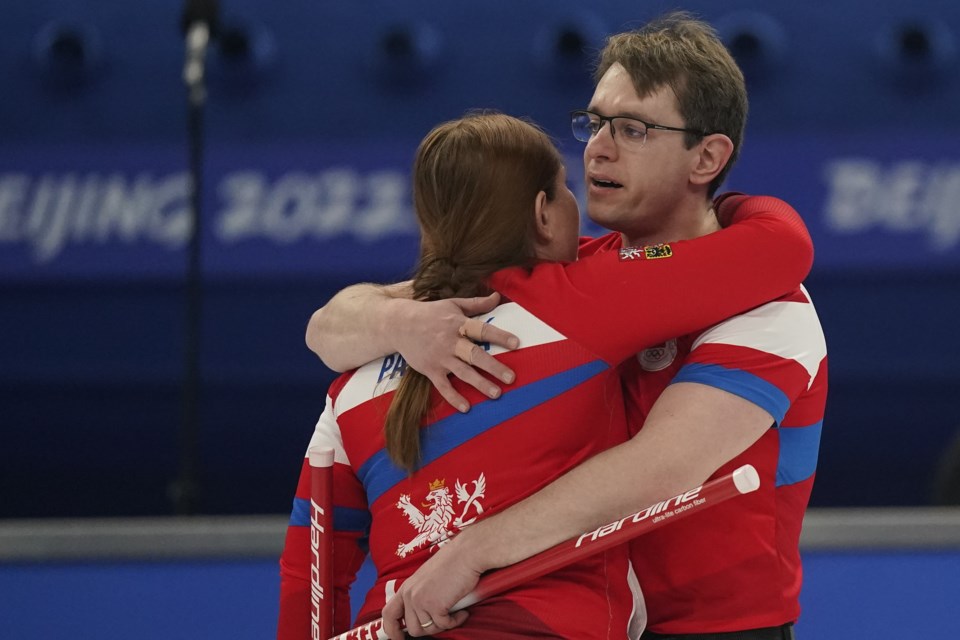BEIJING (AP) ŌĆö When she settled into her room at the athleteŌĆÖs village in Beijing, American curler Nina Roth to remind herself of the support she has back home.
Her teammates brought the real thing.
Skip Tabitha Peterson needs only to look down the ice for a comforting face: Her sister, Tara, is also on the U.S. womenŌĆÖs team. Becca HamiltonŌĆÖs brother is playing for the American men, giving them something most athletes at these Olympics canŌĆÖt have ŌĆö family in Beijing to support them.
ŌĆ£To be able to lean on my brother ŌĆö and I guess itŌĆÖs the same for the sisters on my team, they have each other ŌĆö itŌĆÖs just awesome to have some sort of family here,ŌĆØ Becca Hamilton said. ŌĆ£I mean itŌĆÖs not always rainbows and butterflies. But for the most part, itŌĆÖs great.ŌĆØ
Much like last yearŌĆÖs Summer Games in Tokyo, the Winter Olympics are being played in only partially filled venues and without foreign fans. China has also imposed travel restrictions in an attempt to control the spread of COVID-19.
That forced most athletes to leave at home the small entourage of friends and relatives that would ordinarily accompany them to the Olympics ŌĆö part of the payoff for helping them reach the pinnacle of their sport.
ŌĆ£This is such an opportunity, that our family members also work for, and none of us would be able to do this without their support,ŌĆØ said Roth, who also competed in Pyeongchang. ŌĆ£It was really good fun to celebrate with them at the last Olympics. So itŌĆÖs a big bummer that they canŌĆÖt be here this time.ŌĆØ
But some of her teammates found the perfect way to get around the restrictions. The Hamiltons competed as a mixed doubles pair four years ago and are still spending plenty of time together at these Olympics.
ŌĆ£IŌĆÖve got, like, one of my best friends and my curling partner here,ŌĆØ Matt Hamilton said. ŌĆ£Not only do I have a sister and a confidant in here, IŌĆÖve got someone whoŌĆÖll do my laundry. ... So she really takes care of me while weŌĆÖre out here.ŌĆØ
They aren't the only families hanging out at the Ice Cube curling venue this month.
The mixed doubles field last week featured two married couples: NorwayŌĆÖs Magnus Nedregotten and Kristin Skaslien, who won the silver medal, and Czechs Zuzana Paulova and Tomas Paul. Canadian men's and women's players Jocelyn Peterman and Brett Gallant are engaged, with plans to wed in June.
And the Danish womenŌĆÖs curling team also includes a pair of sisters, Madeleine and Denise Dupont.
ŌĆ£I think it just makes the bond between us a lot stronger,ŌĆØ Madeleine Dupont said. ŌĆ£I canŌĆÖt imagine not seeing her all the time.ŌĆØ
A niche sport played mostly in a few colder climes, curling has long been a family affair, passed down from parents like a treasured heirloom or favorite recipe.
Norway's Magnus Vaagberg is the son of two Olympic curlers. His father, Lars, and uncle Paal Trulsen won gold in 2002 in a foursome that also included Magnus' current teammate ŌĆö and six-time Olympian ŌĆö Torger Nergaard.
ŌĆ£I remember staying up late, understanding that something cool had happened,ŌĆØ said Vaagberg, who was 7 at the time. ŌĆ£ThatŌĆÖs something very unique with curling, a tight family bond all over. So you play against the people that played against my father at the time, and their sons and daughters, itŌĆÖs quite cool.ŌĆØ
The PetersonsŌĆÖ mother grew up in Winnipeg, Manitoba, and picked up curling from her father. She taught it to her daughters, who started when they were 10 and 8; a brother, Trent, also curled for a while before turning to professional golf.
ŌĆ£YouŌĆÖre kind of born into the sport,ŌĆØ Tara Peterson said.
While siblings might be expected to team up, there's no guarantee that they'll get along over the hundreds of hours they spend together practicing, playing and traveling to tournaments each year. Tensions between any set of teammates can boil over ŌĆö even before adding in the additional resentment over who wrecked the family car or neglected to take out the trash.
Madeleine Dupont said she and her sister used to fight about curling until their mother would give them a time out.
ŌĆ£When we were young, 100%, my mom was always like, ŌĆśNow we need curling-free time. You canŌĆÖt talk about curling all the time,ŌĆÖŌĆØ she said. ŌĆ£Now we all live separate places, so itŌĆÖs not a problem anymore. But itŌĆÖs still hard to just leave it at the rink.ŌĆØ
Nedregotten said he and Skaslien do what they call a ŌĆ£hot washŌĆØ ŌĆö talking out their feelings before moving on to the next match. Mostly, though, the siblings and spouses say teaming up with a relative might even offer a competitive edge.
ŌĆ£WeŌĆÖre on the same page a lot without even really need to say anything,ŌĆØ Tabitha Peterson said. ŌĆ£If there is any conflict, or whatever, I think itŌĆÖs easier as siblings to kind of forgive and forget a lot quicker."
American menŌĆÖs skip John Shuster is at his fifth Olympics. When he won the gold medal in Pyeongchang, his parents, wife and one of his children were in the crowd. These Games, he is FaceTiming his family from 14 time zones away, while they organize watch parties and to stay connected the best way they can.
ŌĆ£IŌĆÖve been fortunate to have them with me at four Olympics,ŌĆØ Shuster said. ŌĆ£This is a chance for them to be at home and experience the Olympics with a lot of friends and family that have never come to the Olympics with us.
ŌĆ£TheyŌĆÖre getting a chance to see that other side,ŌĆØ he said. ŌĆ£ItŌĆÖs not better, for sure. But itŌĆÖs not really feeling any worse, either.ŌĆØ
___
More AP Olympics: https://apnews.com/hub/winter-olympics and https://twitter.com/AP_Sports
Jimmy Golen, The Associated Press

